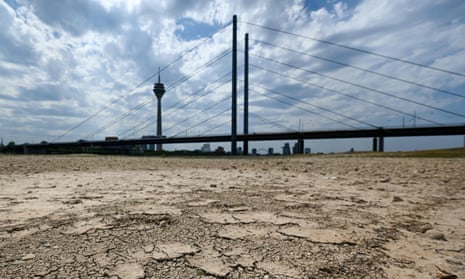Around the world, we’re witnessing the impacts of global heating: in the past week, airport runways have melted in the UK, wildfires have torched huge swathes of Europe, and more than 100 million Americans have sweltered in dangerously high temperatures. Already this year, prolonged heatwaves and drought in many of the world’s breadbaskets have exacerbated a global food shortage that has raised the number of people living with food insecurity from 440 million to 1.6 billion.
There are many to blame for the climate crisis and its extreme weather impacts. Executives of fossil fuel companies bear the greatest responsibility. More than anything else, it has been their great deceit – their burying of climate science, funding of climate denial, and spending of billions to kill climate policy – that has prevented us from transitioning away from an economy powered by coal, oil and gas. Compromised politicians, including the entire Republican party and the Democratic coal baron Joe Manchin, deserve special condemnation, too.
In the cast of climate villains, however, another character rises to claim a special place on center stage: Wall Street.
On 12 December 2015, virtually every nation on earth adopted the Paris agreement. “Today, the American people can be proud – because this historic agreement is a tribute to American leadership,” enthused President Obama. But there were problems from the beginning. The most obvious was that the agreement was voluntary; it lacked a legally binding commitment to reduce emissions. Another major problem was that no one on Wall Street was paying attention.
Since the Paris Agreement, the six largest US banks – Chase, Citi, Wells Fargo, Bank of America, Morgan Stanley and Goldman Sachs – have provided $1.4tn in financing to the fossil fuel industry. Indeed, since that heralded day in the French capital, the world’s four largest funders of fossil fuel expansion have all been US banks. So much for “American leadership”.
It’s not as if Wall Street hasn’t been warned. The environmental group Rainforest Action Network started campaigning to get Bank of America to end coal financing in 2010. In 2016, Indigenous-led protests demanding that banks end their financing of the Dakota Access pipeline shut down bank branches across the country. Cities, including Seattle and San Francisco, committed to cutting ties with the banks funding the pipeline.
In more recent times, the outcry has spread from activists to customers and investors. This year, more than 38,000 customers joined a campaign urging their bank to end fossil fuel financing. Thousands more have pledged to cut ties with their bank altogether if there isn’t progress soon. At JPMorgan Chase’s 2020 shareholder meeting, 49.6% of investors voted in favor of the bank aligning its financing with the goals of the Paris agreement.
In response to this pressure, US banks have released a spate of climate promises, committing to achieve net zero by 2050 and reduce emissions by 2030. But the hard truth remains: Wall Street’s financing of coal, oil and gas was higher in 2021 than it was in 2016, the year after the Paris agreement was adopted. Last year alone, US banks provided $64bn in financing to the corporations most rapidly expanding their coal, oil and gas operations – never mind the fact that such development will lead to a level of climate change that will make today’s extreme heat seem like a breezy day in the park.
It would be bad enough if all Wall Street was doing was funding fossil fuel expansion, but it’s far from it.
When investors filed a shareholder resolution at Citi this year calling for the bank to take the actions the International Energy Agency has concluded are required to give us even a 50% chance of limiting global warming to 1.5C, Citi’s CEO, Jane Fraser, vehemently opposed the resolution and mischaracterized it as an attempt to “shut down the fossil fuel economy overnight” .
After Putin launched his war on Ukraine, the CEO of Chase, Jamie Dimon, joined the CEOs of ExxonMobil and ConocoPhillips to directly lobby President Biden to increase domestic fossil fuel production. A month later, Dimon used his influential annual letter to shareholders to further lobby on behalf of his oil and gas clients. “We also need immediate approval for additional oil leases and gas pipelines,” he wrote, despite the fact that newly approved oil and gas projects won’t come online for years and won’t help solve the current energy crisis.
As we swelter through these early days of the climate crisis, we should keep in mind that our banks are deeply culpable for climate breakdown and that they are often using our money to make it even worse. And once we realize that, the real question is: what are we going to do about it?
Alec Connon is the coalition co-director of Stop the Money Pipeline, a network of more than 200 organizations working on getting US-based financial institutions to align their business models with the goals of the Paris agreement
